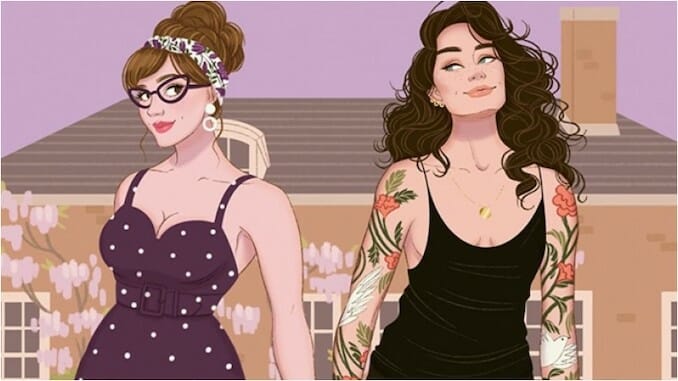Delilah Green Doesn’t Care: A Sexy Queer Romance with Emotional Heft

Could you ever date that person from your childhood? Whether they tormented you or were simply weird, someone guaranteed to make your friends’ eyes go wide? Or, perhaps more richly in this case, what does it mean for someone who’s always running away and someone who feels perpetually left behind to find themselves incapable of staying apart, even if their connection seems doomed from the start?
In her first novel for adult readers, Ashley Herring Blake (Ivy Aberdeen’s Letter to the World, Girl Made of Stars) brings a fun mix of soul searching and sexiness, friendship, and family. The women of Delilah Green Doesn’t Care tease and tempt, dig into past hurts, and scheme in secret. With multiple decades’ worth of history between them, none of them expect anything new to happen, yet they all find the ground shifting beneath their feet over the course of the book, as their relationships to one another and to some of the people they value most shift dramatically, or simply become illuminated for the first time.
Delilah Green is a queer New York City photographer trying to make her mark on the art world, and she’s doing everything from waiting tables to shooting weddings and bar mitzvahs in the meantime. Claire Sutherland is a bisexual single mom doing the best she can for her 11-year-old daughter Ruby while running the bookstore her own mother used to own in Bright Falls, Oregon. The two women reunite during a charged interaction where only one of them recognizes the other at a bar in their hometown—the one Claire never got to leave because she got pregnant at 18, and the one Delilah left at 18 and (almost) never looked back. Delilah is back to photograph the wedding of her much-loathed stepsister Astrid Parker, a.k.a. Claire’s best friend, bringing back Delilah’s memories of mean girls and a lonely childhood.
If you’ve ever snarked at cishet weddings—especially WASPs, designer clothing in inappropriate settings, and the concept of “propriety”—then come sit by Delilah Green as she narrates alternating chapters, trying to entertain herself and cash a check she badly needs while low-key hoping to ruin her step monsters’ lives. Claire, on the other hand, seems to always be the most caring person in the room (to everyone other than herself) and offers another perspective on Delilah’s past, with both her own memories and her secondhand recollections of how her best friend/Delilah’s stepsister Astrid interpreted the same events.
The book deploys beloved tropes well, making favorites like “only one bed” as much a heartbreak for one of the leads as it is an opportunity for romantic tension. The very premise of Delilah’s presence—-that she’s there to photograph two weeks’ worth of wedding festivities—-capitalizes on the growing phenomenon of fussy, overstuffed nuptials, just begging readers to snark alongside Delilah and later Claire and Iris as they pratfall and plot their way through ruining and/or saving Astrid from her wedding.
Delilah Green Doesn’t Care understands that there’s no conflict between scheming to take down a controlling partner who doesn’t respect your friend while also dreaming of—-and getting!—-swoon-worthy romance like cute dates, good sex, and so much sizzling banter. It’s always satisfying to read a queer adult romance where the leads are equally as good a fit emotionally as they are sexually, with due care paid to the writing of both aspects of their relationship. These two openly want and yearn, but they don’t quietly pine. They are women of action, who go for what they want.
-

-

-

-

-

-

-

-

-

-

-

-

-

-

-

-

-

-

-

-

-

-

-

-

-

-

-

-

-

-

-

-

-

-

-

-

-

-

-

-








































